All About Balkans Trip Notes
Trip Overview
PrintJoin on a discovery of the iconic cities and impressive highlights of the Balkans. Get to discover Sofia, Skopje, Belgrade, Sarajevo and Tirana. Roam the ever-popular and lively Croatian coast while craving the calming serenity and charm of Albania and Montenegro. Chase Alexander the Great from Macedonia to Greece and uncover the mysteries of floating monasteries of Meteora. Meet the Oracle of Delhi before climbing up to the Acropolis to get a panoramic view of a capital of ancient world, Athens. Above all, touch shoulders with countless Balkan civilizations as you witness their beautiful interaction and create lifelong travel memories.
Duration : 12 Days
Destination : Balkans
Start/Ends in : Sofia / Athens
Group Size : 13-42 People
Age Req. : 18+
Trip Theme : Discovery, Overland
Departs : April to December
Why you will love this tour
- * Explore the essential highlights of 7 Balkan countries in 9 days, staying at comfortable 4-star hotels and travelling on a private modern coach.
- * Travel with a local guide throughout your trip to get the best insight and tips, plus enjoy professional guided tours in Belgrade, Dubrovnik, Kotor, Ohrid and Skopje.
- * Delve into history and greet the colourful Balkan cultures riding from one capital to another, while frequenting popular hotspots and gems off the beaten track.
- * Swim the Adriatic and walk around the impressive medieval fortresses of Dubrovnik and Kotor.
- * Uncover the stunning natural beauty of Ohrid Lake with an optional trip to the serene St. Naum Monastery.
- * Head inland to Greece through vibrant Thessaloniki, the floating monasteries of Meteora and the ancient home of Oracle of Delphi before finishing in Athens.
- * No night drives, however we need to cross multiple borders and customs process may take some time depending on how busy it is.
Arrival Details
The group welcome meeting with you guide and other travellers is held around 18:30 at the hotel lobby on Day 1 of your tour, unless otherwise notified.
Meeting Point:
The meeting point for this tour is:
Novotel – SOFIA
Address : 115 N, Boulevard “Tsarigradsko shose” Blvd, 1784 м.Къро, Sofia, Bulgaria
Phone : 00359 2 806 6000
Emergency Number: +44 203 14 99 200
Airport Transfers:
All tours starting in Sofia include arrival airport transfer if your flight lands in Sofia on the first day of your tour between 5am and 11:30pm.
To arrange your airport transfer please email us the following information at least 2 weeks before your departure date. [email protected]
Travel Date, Flight Number, Local Arrival Time, Name/s of the Passengers
Making Your Own Way to the Starting Point
The arrival hotel is 8 km away from the Sofia Airport (SOF). It takes about 15 min. – 20 min. by taxi depending on the traffic. You can take a taxi from the airport directly to the hotel, which is expected to cost around BGN 10-15. You can use OK Supertrans AD taxi company ( yellow cabs). We recommend to avoid cabs offered outside the office of the taxi operator or in front of the terminal as these can be more costly.
Finishing Point:
The finishing point for this tour is:
Arion Hotel – ATHENS
Address : Ag. Dimitriou 18, Athina 105 54, Greece
Phone : +30 21 0324 0415
Emergency Number: +44 203 14 99 200
Highlights
Belgrade: One of the oldest cities in Europe and the only one built on the confluence of two rivers, also known as the city that never sleeps
Dubrovnik: This complex is one of the most beautiful and strongest fortified systems in Europe, but the lively streets show that there is more!
Kotor: Kotor is a fortified town on Montenegro’s Adriatic coast, in a bay near the limestone cliffs of Mt. Lovćen.
Mostar: Mostar is a city in Bosnia and Herzegovina, and known for the iconic Stari Most (Old Bridge) and the jumpers off the bridge.
Ohrid: Ohrid is a large town in North Macedonia on the shore of Lake Ohrid and a UNESCO heritage site since 1980.
Sarajevo: Sarajevo, capital of Bosnia, is a compact city on the Miljacka River, the center has museums commemorating local history.
Shkodra: Shkodër or Shkodra is the fourth largest city in Albania and one of the oldest places in the Balkan peninsula.
Skopje: Skopje is the capital and largest city of the North Macedonia and it lies in the heart of the Balkan Peninsula region.
Sofia: Sofia is the capital and largest city of Bulgaria.ıt has rich history from Roman and Ottoman Empires. Also famous with it’s night life.
Tirana: Tirana is the capital and largest city of Albania.It is also culturel and economical, politically center of the country.
Trebinje: Trebinje is a small sized city situated in the Trebišnjica river valley in south eastern Herzegovina, about 30 km by road from Dubrovnik.
Athens: You will fall in love with the perfect combination of culture, history and the dynamic contemporary life in one of the oldest cities in the world.
Delphi: Delphi lying on the slopes of Mount Parnassus high above the Gulf of Corinth, is one of the most famous historic sites in Greece.
Kalambaka: Kalambaka is a town and seat of the Municipality of Meteora in the Trikala regional unit, part of Thessaly in Greece.
Thessaloniki: Thessaloniki is the second largest city of Greece and has a rich history from the Roman period. it lies in the Agean sea coast.
Itinerary
Please note that the itinerary may be subject to small changes depending on the conditions during the tour. Alternative accommodation of similar standards may be used depending on the group size and hotel availability.
Inclusions & Exclusions
The tour price covers the following services:
Accomodation : 4 star hotels
Airport Transfer : Arrival transfer on day one.
Meals : 11 breakfasts
Transportation : Air-conditioned modern non-smoking coach or mini-bus
Guide : Services of experienced Travel Talk local guides licensed by the Ministry of Tourism
Sightseeing: Sofia, Belgrade, Skopje, Sarajevo, Mostar Bridge, Ohrid, Tirana, Dubrovnik, Kotor, Shkoder, Meteora, Delphi, Kalambaka, Thessaloniki
What is NOT included in the tour price?
- Any flights not mentioned above
- Travel insurance
- Meals not stated above
- Items of a personal nature
- Tips & gestures
- Entrance fees to the sights and museums
- Optional activities
- Other services not stated in the itinerary
Hotels & Accomodation
Solo travellers will be roomed with another solo traveller of the same gender in a twin or triple room, or can upgrade to a solo room by paying the single supplement. You may choose the solo room option when booking online or contact us to arrange a private room. Your tour leader will allocate rooms upon arrival at the starting hotel in accordance with the rooming lists, last minute changes may not be guaranteed.
NOVOTEL – SOFIA – 4 Star
Novotel Sofia offers various facilities such as a restaurant, fitness center and bar. Rooms are fitted with a coffee/tea maker. Sofia Airport is only 4 km away.
ABBA HOTEL – BELGRADE – 4 Star
Discover some of the most elegant hotel rooms in Belgrade, designed to immerse the guests in apsolute comfort and unparaleled luxury.
IBIS STYLE HOTEL – SARAJEVO – 4 Star
Ibis Style Hotel offers various facilities such as swimming pool and a wellness centre. The hotel has a rich continental breakfast buffet.
HOTEL CENTRAL PARK – TREBINJE – 4 Star
Hotel Central Park is located in Trebinje and has a terrace with a nice and cozy restaurant.The hotel is in a building that has a very interesting history.
GRAND HOTEL EUROPA – SHKODER – 5 Star
Located in the centre of Shkoder, Grand Hotel Europa features a fitness center & SPA. Clasically decorated rooms are air-conditioned and have LCD TV.
HOTEL NOVA RIVIERA – OHRID – 4 Star
A charming hotel located on the shores of Ohrid Lake. Hotel offers spacious rooms and an on-site restaurant & bar that have breathtaking views.
HOTEL AQUALINA – OHRID – 4 Star
This hotel is located on the shore of Lake Ohrid, surrounded by the amazing clear water on one side and the endless green forests of National Park Galicica.
HOTEL PANORAMIKA – SKOPJE – 4 Star
Hotel Panoramika in Skopje offers breathtaking views of the cityscape, combining modern amenities with a touch of elegance to provide guests with a memorable and comfortable stay.
ABC HOTEL – THESSALONIKI – 3 Star
Located in a short walking distance to the Archaeological & Byzantine Museums, the shopping center as well as numerous restaurants, cafes, taverns and bars.
HERMES HOTEL – DELPHI – 3 Star
The Hermes is a charming traditional mountain style hotel in the city of Delphi with view of the olive grove. The archaeological sites are a short distance away.
ARION HOTEL – ATHENS – 3 Star
Within walking distance of Athens’ top attractions such as the Acropolis, Plaka, this hotel is yet hidden away from the old town.
Distances
Please find below the approximate driving times between the destinations visited in the Balkans. We will always strive to take a short break every few hours to enable passengers to stretch their legs, purchase snacks and use wash facilities during long drives. Please note that crossing borders may take only several minutes or up to a few hours, depending on how busy the border control is. The driving times listed below do not take into account the waiting time to cross the border.
Sofia – Belgrade: 400 km – 4.5 hrs
Belgrade – Sarajevo: 290 km – 5 hrs
Sarajevo – Mostar: 130 km – 2 hrs
Mostar – Trebinje: 120 km – 2 hrs
Trebinje – Dubrovnik: 32 km – 1 hr
Trebinje – Kotor: 80 km – 2 hrs
Kotor – Shkoder: 107 km – 2,5 hrs
Shkoder – Tirana: 100 km – 1.5 hrs
Tirana – Ohrid: 135 km – 2.5 hrs
Ohrid – Skopje: 170 km – 3 hrs
Skopje – Thessaloniki: 230 km – 4 hrs
Thessaloniki – Kalambaka: 230 km – 3 hrs
Meteora – Delphi: 4.5 hrs
Delphi – Athens: 2 hrs
Budgeting
Please note that entrance fees to sights and optional activities are not included in the tour price. Optional activities are not operated by Travel Talk and may require a certain number of attendees to run. Your guide will be happy to inform you further about the available optional activities at the start of your tour. Optional activities are also listed under each day in your tour itinerary.
Optional Activities
Kravice Waterfalls — EUR 30
Dubrovnik Boat Trip — EUR 40
Balkan Night With Dinner — EUR 35
St. Naum Tour — EUR 20
Personal Spending
The Balkans region covers Europe’s three great southern peninsulas and is comprised of 12 nations, meaning there’s multiple currencies that you will handle throughout your tour. The main currencies include Serbian Dinar, Bosnian Mark, Kuna (Croatia), Lek (Albania) and Euro (Greece). We recommend carrying extra Euros which are accepted in most larger hotels or shops across the region. Here you will find the average cost for a meal or drink and advice for best practice in tipping.
Meals
Lunch at restaurant : US$ 7-10
Dinner at restaurant : US$ 12-15
Ćevapi at a stall : US$ 3-5
Baklava : US$ 1-2
Drinks
Bottle of water : US$ 0.5
Coffee : US$ 1-3
Tea : US$ 1-2
Bottle of beer : US$ 1-3
Tipping
Tipping is not compulsory in the Balkans region but is appreciated for good service. If satisfied with service, then we suggest leaving a tip of ~10% in restaurants. While at bars or taxis, rounding off the amount is considered sufficient. Your Guide and Driver would also appreciate tipping as a sign of gratitude at the end of your tour.
Shopping
No holiday is complete without a little shopping, like many other Balkan destinations you will find that there is some great shopping and purchases to be made in Serbia, Croatia, Macedonia, Albania, Bosnia & Herzegovina. From the standard tourist souvenirs to fine boutique jewellery and clothing shops, souvenirs you are bound to find something to satisfy the shopping itch.
The cosmopolitan city of Belgrade offers quality shopping encounters with a range of luxurious shopping malls and supermarkets, local bakeries and street markets worth exploring. The city centre is packed with boutiques and souvenir shops selling traditional textiles, Serbian pottery and historic memorabilia from the Yugoslavia days. The open-air bazaars of Bulevar Kralja Aleksandra are worthy of a stop to hunt down some uniquely Serbian souvenirs.
Essential Information: Balkans
Passport & Visas
If you’re from the UK, Australia, New Zealand, United States or Canada, you can enter the following Balkan countries for a touristic stay of up to 90 days without a visa: Serbia, Croatia, Montenegro, BosniaHerzegovina, Bulgaria, Albania, North Macedonia, Greece. Passport validity entry requirements may change per nationality. We generally recommend to have a passport with at least 6 months of remaining validity.
This information is provided only as a guidance, we strongly advise that you check with the consulate or embassy as this information can change at any time and with little notice. It is your responsibility to make sure that all the required travel documents are ready when travelling.
Travel Advice
We are closely monitoring the latest travel updates to Balkans, and following the advice of the UK Foreign Office. For the latest travel advice from UK Foreign, Commonwealth & Development Office (FCDO), please visit: https://www.gov.uk/foreign-travel-advice/
We recommend all travellers to check their Government National Travel Advisory prior to their departure:
Australia – https://www.smartraveller.gov.au/
Canada – https://travel.gc.ca/
New Zealand – https://www.safetravel.govt.nz/
USA – https://travel.state.gov/
Travel Insurance
All passengers travelling with Travel Talk are required to have personal travel insurance before participating in any of our tours. Your guide will collect your travel insurance details on the first day of your trip. It is your responsibility to make sure you have an adequate and suitable travel insurance for you in place, you may read more at https://www.traveltalktours.com/travel-insurance
Health & Safety
The health and safety of our passengers, staff and communities visited is of utmost priority. As we monitor and comply with the official advice from the UK Foreign Office, as well as World Health Organization and government authorities regularly, we have implemented several policies and precautions on our tours for your wellbeing. You may find our Safe Travels Protocols at https://www.traveltalktours.com/safe-travels
Travel Talk Adventures has received the Safe Travels stamp by the World Travel and Tourism Council (WTTC), which allows travellers to recognise companies around the world that have adopted health and hygiene global standardised protocols – so consumers canexperience ‘Safe Travels’.
Please make sure to regularly check your Government’s travel advice before travelling and be well-informed of any requirements. Your tour guide will also notify you of the regulations and protocols to follow throughout your trip with us.
Please note that if any traveller is unable to complete the itinerary or possess a potential risk to themselves and/or the rest of the group, we reserve the right to remove them from all or part of a trip.
Please consult with your doctor for the latest medical travel information and any vaccinations you may need. We recommend that you bring any personal medical requirements and medications with you as these may be difficult to obtain while on tour.
Weather
The Balkans is a geographically diverse region spanning over multiple countries and 500,000km2, hosting various climates. However, it is fair to expect a somewhat continental climate with hot summers and cool winters, and a milder Mediterranean climate on the coastline.
The Summer months of July and August are considered Europe’s busiest with high temperatures attracting flocks of locals and travellers to the breath-taking coastal regions. The shoulder seasons of April to June and September to October are also considered a great time to visit the Balkans. During these months, the weather tends to be milder, with the major tourist cities less populated. The Winter months between December and March are quite colder with occasional snow. Meanwhile, the coastal regions of Croatia, Montenegro and Albania are known for their significantly warmer winters than the Central Balkans.
Check out our weather guide for the best time to visit the Balkans.
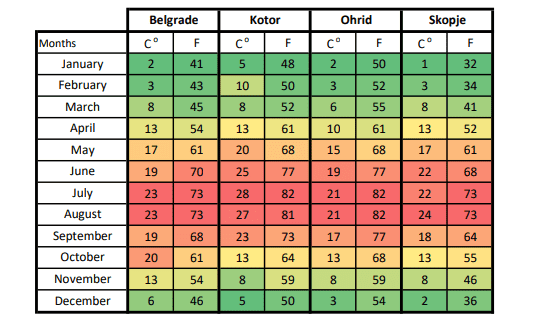
Money Matters
The Balkans region covers Europe’s three great southern peninsulas and is comprised of 12 nations, meaning there’s multiple currencies that you will handle throughout your tour. The main currencies include Serbian Dinar, Bosnia Herzegovina Mark, Croatian Kuna, Albanian Lek, Macedonian Denar and Euro (Montenegro, Greece). Euro is easily convertible to the local currencies and may be accepted at certain locations, however it is always more advantageous to pay in the local currency
Credit and debit cards are widely accepted in major cities and tourist sites across the Balkans. However, if you are travelling off the beaten track, come prepared with a small stash of cash on hand for inexpensive purchases at small shops and vendors, entrance fees or small meals. ATMs can be easily found in many places across the cities.
We recommend you do not exchange bulk sums of money at the airport, as the exchange rates are usually more favourable in the major cities. Your tour leader will be happy to help if you need any assistance.
Please remember that everyone has different spending habits, some prefer to spend more on souvenirs, some on experiences and others on a night out! Make sure to budget your trip to your spending habits for shopping, drinking, and tipping.
Tipping is not compulsory in the Balkans region but is appreciated for good service. If satisfied with the service, then we suggest leaving a tip of ~10% in restaurants. While at bars or taxis, rounding off the amount is considered sufficient. Your Tour Leader and Driver would also appreciate tipping as a sign of gratitude at the end of your tour.
Eating & Drinking
Balkan cuisine is vast and diverse in itself while also carrying hints of Greek, Persian and Turkish cuisines. While some popular regional recipes have shaped according to the tastes of each country, there are plentiful unique dishes to each area. Balkans food is typically known to be a hearty, meat-heavy cuisine with a large sharing aspect involved. So, if you are eager to dive straight into the Balkan culture through its food, be sure to try these iconic dishes. For more, check out our Balkan food guide.
Ćevapčići: Small finger-sized skinless sausages made from beef, lamb, pork or veal and served inside a flatbread.
Ajvar: Like pesto is to Italy, Ajvar is to the Balkans. The sauce is served with almost any meaty order and consists of mainly roasted red peppers and garlic.
Dolma: The most eaten Dolma dish consists of rice wrapped in leaves. The filling and wrap can vary widely, but in the Balkans region dolma’s made of onion, zucchini, cabbage, meat and stuff tomatoes are common.
Pljeskavica: A round patty made of beef, lamb, pork or veal, depending on where you are visiting in the Balkans. It is common to eat these patties plain or on a bun with ajvar spread, like a Balkan-style burger!
Čobanac: This hearty meat stew, originally from Croatia, is cooked in a cauldron hung over an open fire pit.
Banitsa: This Bulgarian inspired dish is made of eggs and cheese baked into a flaky, melt-in-your-mouth pastry. Other varieties of the dish include yoghurt, honey, pumpkin or spinach.
Stuffed Pepper: A common Balkan food, stuffed peppers are usually filled to the brim with simple ingredients including meat, rice, paprika, tomato sauce, onions and garlic.
Baklava: Baklava is a sweet syrupy layered pastry with honey and nuts, quite popular in Greece, Albania and Turkey.
Gozleme: Thin savoury pancakes filled with cheese, mushroom, spinach, or potato
When it comes to drinking – Croatia, Macedonia, Montenegro, Serbia and Bulgaria all offer unexpected delights for wine-lovers! The Balkans region is known for its diverse range of affordable drops. Along with the classic beer destinations, a number of young brewers from the Balkans have managed to put their name on the ‘beer map’ with Bulgaria, Serbia and Greece home to fantastic micro-breweries. Finally, ‘Rakija’, ‘Raki’ or ‘Rakia’ is by far the most famous spirit of the Balkans, which can be made of almost any fruit!
Essentials to Bring & Internet
-Face mask/cover and hand sanitiser enough for your personal use throughout the trip – See more at https://www.traveltalktours.com/safe-travels/
-Travel Documents: Passport, Visa (if required), flight or transport ticket (and photocopies)
-Travel Talk Tour Voucher (printed or digital)Travel Insurance Policy (and photocopy)
-Personal medical kit and medicine
-Money (cash, credit card, travellers’ cheques)
-Power Adapter
-Reusable water bottle
-Ear plugs and eye mask
-Sun protection – hat, sunglasses, sunscreen
-Comfortable, closed walking shoes
-Wind/water proof jacket
-Warm clothes, hat, and gloves for cold weather
-Sandals, swimwear, shorts for warm weather
Internet Access
Complimentary Wi-Fi is available in most hotels, some cafes, and restaurants visited during Travel Talk tours. If you come from another EU Country, you may be able to use your phone without any additional roaming charges, please consult with your mobile provider. Make sure to enable data roaming on your mobile if you
wish to use 3G/4G abroad, although the connection may be unreliable in smaller towns and rural areas. Purchasing a European SIM card for the duration of your tour may be a cost-effective option. Your guide will be happy to advise on this.
Culture and Traditions
The Balkans region of Europe is particularly rich in folklore and traditions. Ethnic diversity is one of the Balkans’ most characteristic social and political features. It has been said that the Balkans have produced more history than they can consume. The region has not been controlled by only one government since the Roman Empire, and it continues to compete with the East-West divide since the Empire’s split in the 4th century. Your Tour Leader will provide immense detail of such events throughout your tour, but here is a light preview to get you started!
Albania: Religious practice in Albania is diverse with several religions including Islam, Christianity and Judaism all co-existing peacefully. Until fairly recently, the beautiful landscapes, fortress towns and dazzling beaches of Albania were merely a rumour for most travellers. But, with the end of communism in 1991, Albania opened its gates to tourists.
Bosnia and Herzegovina: Boasting a unique East-meets-West atmosphere that blends Ottoman and AustroHungarian histories, Bosnia the former-Yugoslavian nation is a treasure-trove of natural beauty, culture and history. The country still holds scars from its heart-breaking civil war of the 1990s which finished only 20 years ago. In Bosnia, coffee is not only traditional, but a way of life. Bosnian coffee is strong, thick and served from a metal pot into a handle-less tumbler. In terms of religious beliefs, Bosnia is and always has been a melting pot. The Ottomans brought Islam, Catholicism came from the west, and Orthodox Christianity from the east. All of which have added to the vast history and charm of this marvellous country.
Croatia: A land steeped in history, captivating traditions, and cultural heritage. The colourful Croatian culture is deeply rooted in its vast history and reflected in its wonderful architecture and monuments. The country holds its cultural richness with a mixture between European, Mediterranean and Balkan traditions. The Slavic heritage of Croatian people is especially evident throughout the display of charming festivals and national holidays, where cities and villages come to life in traditional costume, folk music and feasts. The bulk of Croatia’s cultural and traditional festivals take place in the country’s capital, Zagreb, in the Spring and Autumn. Although, Dubrovnik and Split also offer a lot in the way of heavyweight music, culture, and drama.
Bulgaria: The culture of Bulgaria is based on an interesting blend of Thracian, Slavic and Bulgar traditions, along with the influence of the Eastern Orthodox Church. Many ancient customs remain, such as Thracian fire dancing, which is recognized by UNESCO as an Intangible Cultural Heritage! Even today, Bulgaria still has a strong folkloric tradition that pervades many aspects of art, literature, music, celebrations, and daily life.
Serbia: Still considered well-off the tourist trail, Serbia is located in the heart of the Balkans and is considered diverse, welcoming and full of culture. The capital city, Belgrade is particularly famous for its nightlife, and this has more to do with an inherent desire to celebrate at any occasion. The Serbian people are a proud nation and closely tied to the Serbian Orthodox Church. The church plays such an important role in the history of the Serbian people that it is difficult to separate them entirely, and religion still plays a vital role in the lives of many ordinary people.
Montenegro: Montenegro is a country of diverse cultures, influenced by its location and junction between Eastern and Western Europe, drawing influences from Ancient Rome, Byzantines and the Ottomans. Generally, Montenegrins are immensely proud of their culture and traditions with art, music, and food major composites of culture in Montenegro. Eastern Orthodoxy is the predominant religion and play a crucial role in daily life, while groups of Catholic Christians and Muslims also coexist peacefully.
North Macedonia: Even by Balkan standards, North Macedonia’s history is characterised by complexity and controversy. It was not until 1991 that the country officially attained its status as an independent nation, having been previously incorporated into the Socialist Republic of Yugoslavia at the conclusion of World War II. With the collapse of European communism came Macedonian independence. Ethnic North Macedonians – who make up the majority of the population and are largely Orthodox Christians, and the country’s notable Albanian Muslim population tend to share certain common values despite their differences.
How to Dress
In general, there are few dress restrictions in Eastern Europe. However, when visiting churches, monasteries or other religious sites modest dress is required – shorts or open-shoulder tops may not be permitted, for both men and women. It is important to cover from shoulders to knees as a sign of respect and women are also often required to wear a headscarf at religious sites.
Solo Travellers
We have many solo travellers joining our tours. Solo travellers will be roomed with another traveller of the same gender. If you would like a private solo room, subject to availability and a single supplement, please contact us.
Rules to Follow
We are committed to ensuring a safe and enjoyable experience for everyone. We do not tolerate any form of violence (physical or verbal), bullying or harassment involving customers, partners, Travel Talk staff or locals. Sexual relationships between a tour leader and a passenger are forbidden.
We will not tolerate any illegal activity, including but not limited to: use and possession of illegal drugs, trespassing, and disrupting public order. If you consume alcohol, please ensure that you drink responsibly and follow the local laws and regulations.
If someone is acting inappropriately regarding these matters, please notify your tour leader immediately or contact us on the emergency contact number provided below.
You must follow the advice of your tour leader and local officials regarding health and safety measures. We operate all tours under Safe Travels protocols for the wellbeing of our passengers, staff and communities visited. Please ensure that you have read the https://www.traveltalktours.com/safe-travels/ and are fully prepared for your trip.
Your tour leader has the right to remove from the group anyone not abiding by these rules, with no right of compensation or refund. See more at https://www.traveltalktours.com/booking-terms/
Please remember that our travellers come from different parts of the world and will have various needs and preferences. Be understanding and patient with your fellow travellers, and always strive to be on time.
Responsible Travel
We believe that travel is a force for good and show our support through various initiatives and charity organizations, as well as keeping the principals of responsible and sustainable travel at the core of our ethos. These values are engrained in our business culture and the design of our trips just the same. Together with you, we strive to make a positive impact on local people and economies, respecting the local culture, environment, social fabric and customs; encouraging respectful and meaningful cross-cultural exchange. Read more at https://www.traveltalktours.com/responsible-travel/
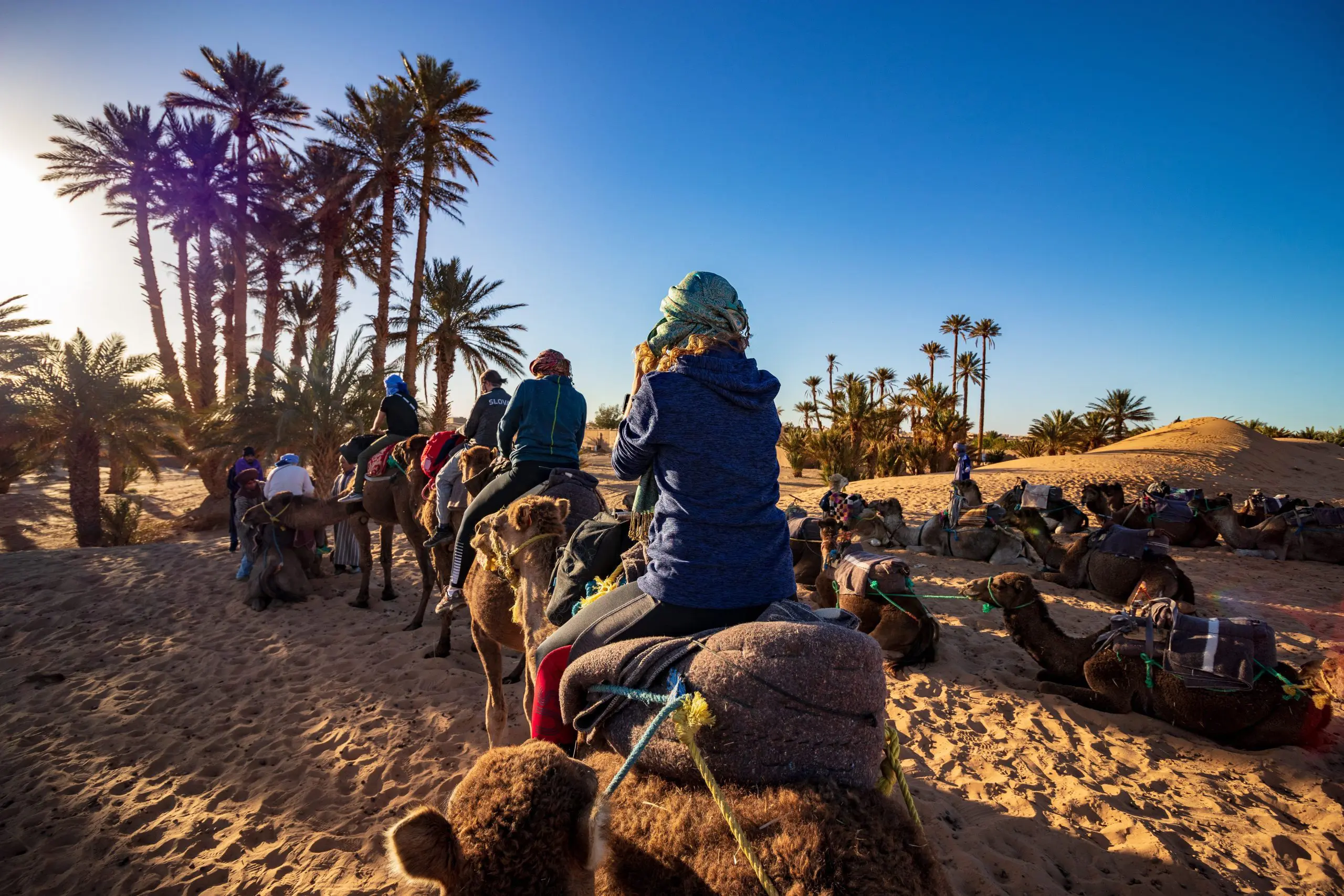 December Sale; Save 50%
December Sale; Save 50%  Croatia Sailing : Save 50%
Croatia Sailing : Save 50% Asia Tours : 50% Off
Asia Tours : 50% Off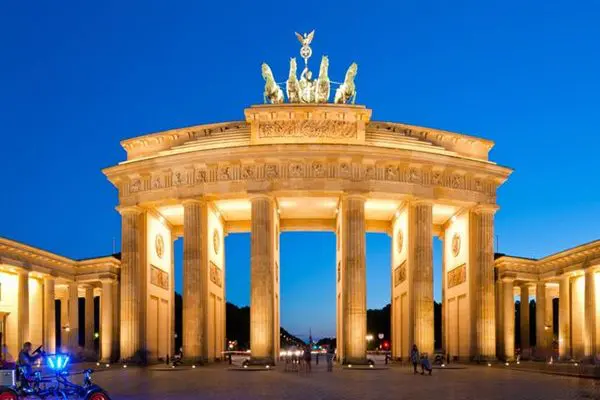 Central & Eastern Europe Tours: 50% Off
Central & Eastern Europe Tours: 50% Off 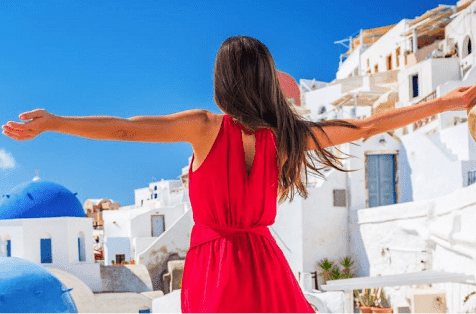 Why Travel Talk
Why Travel Talk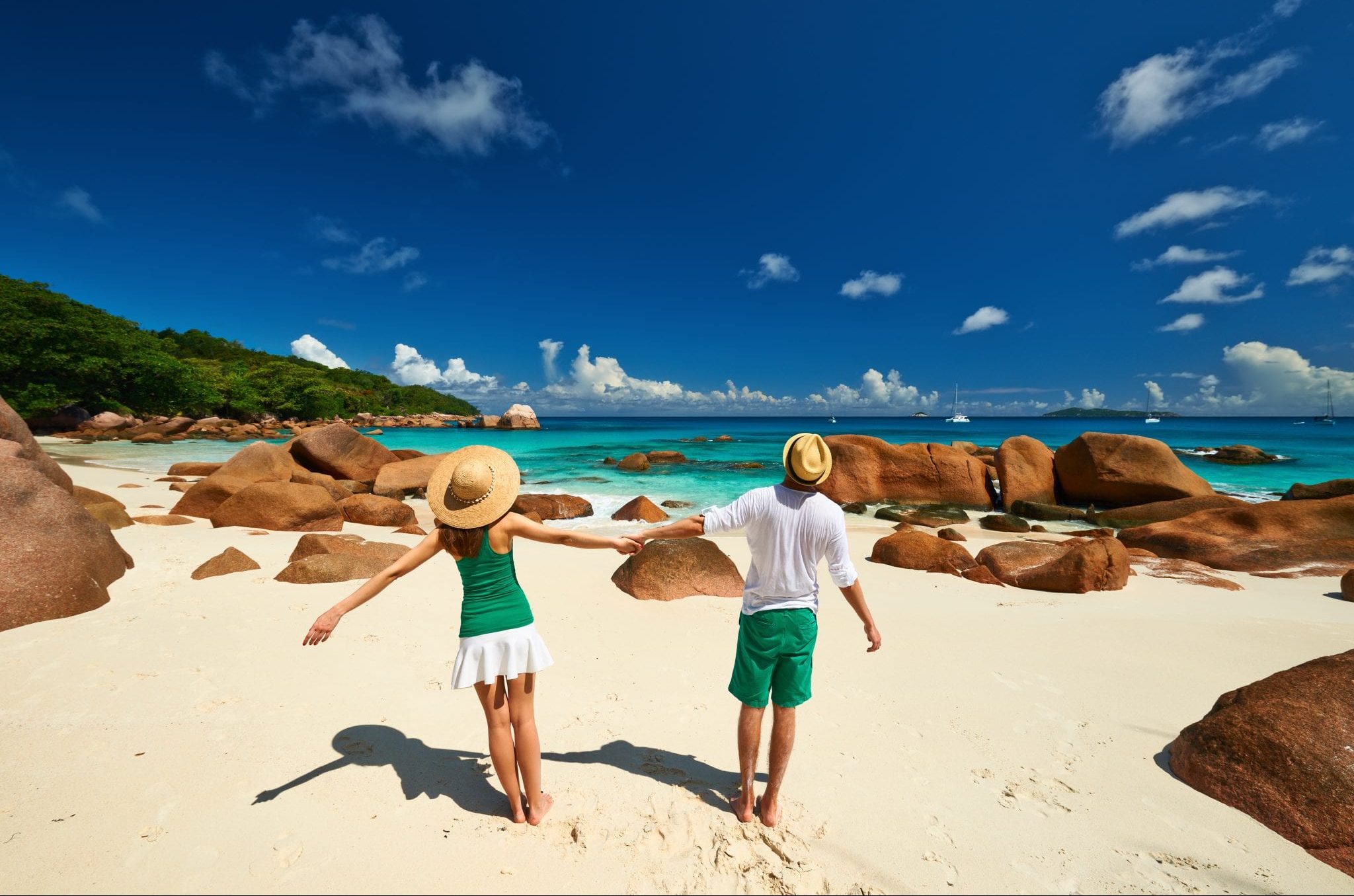 Travel Talk Blog
Travel Talk Blog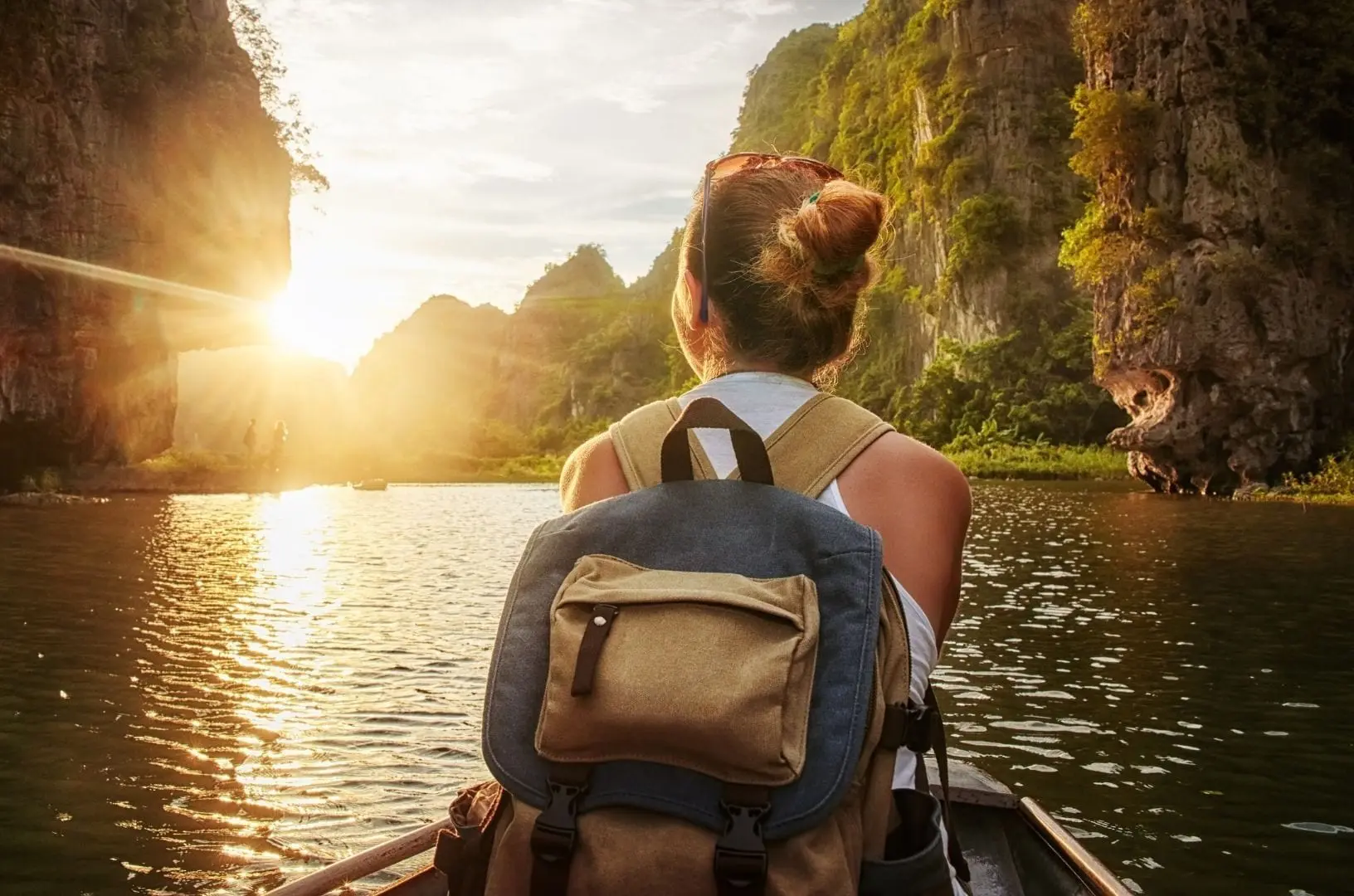 Responsible Travel
Responsible Travel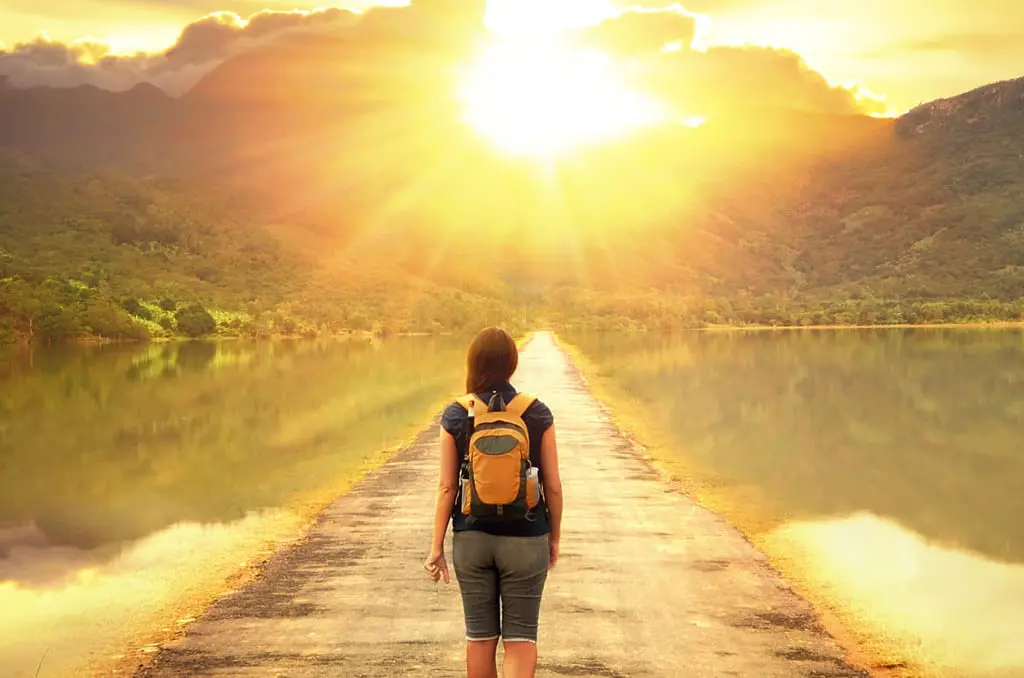 Fair Travels with Travel Talk
Fair Travels with Travel Talk